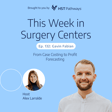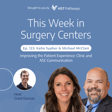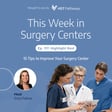
James McClung - Performing an Effective Mock Survey
A surveyor shows up in your lobby, unannounced, with the clipboard in hand, ready to evaluate your surgery center. Are you ready? James McClung, an ASC Developer and Consultant at Reliant Medical Services, is on today's episode to ensure you can confidently answer yes!
In our news recap, we'll cover Google Cloud and Epic's latest plans, a drug shortage created by TikTok, a dire rural hospital situation in Mississippi, and of course, end the news segment with a positive story about a 9-year-old girl who saved her classmate's life by performing the Heimlich.
Articles Mentioned:
Google, Epic partnering to allow Epic hospital clients to run EHRs on Google Cloud
A drug shortage created by TikTok and 10 more supply chain updates
Mississippi at risk of losing over half of its rural hospitals
4th grader uses Heimlich to save fellow student from choking
Brought to you by HST Pathways.



















